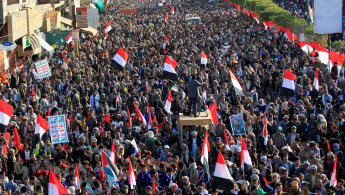Houthis rally in Sanaa after killing of former Yemen President Saleh
Thousands of Houthi supporters rallied in Sanaa on Tuesday as the rebels consolidated their grip on the Yemeni capital after killing former ally and ex-president Ali Abdullah Saleh.
The capital has been rocked by days of fighting between Houthis and Saleh's supporters in southern districts of Sanaa as Saudi coalition airstrikes pounded the city overnight, striking the rebel-held presidential palace at least seven times.
At least 234 people have been killed and 400 wounded in those clashes, the International Committee of the Red Cross said on Tuesday.
Following Saleh's death at the hands of Houthi fighters on Monday, fears had mounted of an uptick in the violence that has devastated the Arab world's poorest country over the past few years.
But there was no repetition of the fierce fighting that had rocked the capital for the five previous nights.
New checkpoints manned by Houthis sprung up across Sanaa as their leaders hailed their control of the capital, rallying supporters and pledging that backers of Saleh were safe.
Houthi supporters gathered in their thousands near the capital's airport on Tuesday shouting "Sanaa is free and the state still stands!" and "Yemenis are one!" as rebel chiefs struck a conciliatory tone, declaring they were "ensuring the safety" of members of Saleh's General People's Congress (GPC) party.
The GPC slammed the Houthis as "militias of treason and backstabbing" in an obituary for one of their top leaders.
Tarek Saleh, a nephew of the ex-president and commander in his troops, died after sustaining shrapnel wounds during the Sanaa clashes, the GPC said on Tuesday.
Houthis target 'collaborators'
Saleh al-Sammad, head of the Houthi's political council, on Monday said he had ordered the security forces to "take steps against the saboteurs and all those who collaborated with them".
Reports of widespread arrests of suspected Saleh supporters in the army and the rebel government also spread through Sanaa, confirmed by GPC vice-President and Yemeni Prime Minister Ahmed Bin Daghr, although not by the Houthis.
Former strongman Saleh retained the loyalty of some of the best equipped units of the army after he was forced to step down as president in 2012.
Saleh, who ruled Yemen for three decades, had joined forces with the Houthis in 2014 when they took control of large parts of the country, including the capital.
But that alliance unravelled over the past week as the former leader reached out to the Saudi-led coalition that has waged an air campaign against the Houthis since March 2015.
Yemen's war has left thousands dead, led to one of the world's worst humanitarian crises and deepened tensions between Middle East rivals Saudi Arabia and Iran, who both took a firm stand on the Yemen conflict on Tuesday.
Saudi Arabia called for a Yemen free of "militias supported by Iran" in its first official statement since the Saleh killing.
Iranian President Hassan Rouhani meanwhile warned that those attacking Yemen would regret it.
"The people of Yemen will make their aggressors regret their actions," he said in a televised speech, referring to Saudi Arabia and its allies.
Arab League chief Ahmed Abul Gheit condemned Saleh's killing, saying that the "way it was done reveals to everyone the criminal nature" of the Houthis.
The United Nations called for a "humanitarian pause" in the air strikes and fighting as it seeks to deliver aid to people trapped in Sanaa.





 Follow the Middle East's top stories in English at The New Arab on Google News
Follow the Middle East's top stories in English at The New Arab on Google News
![The UAE is widely suspected of arming the RSF militia [Getty]](/sites/default/files/styles/image_330x185/public/2024-11/GettyImages-472529908.jpg?h=69f2b9d0&itok=Yauw3YTG)
![Netanyahu furiously denounced the ICC [Getty]](/sites/default/files/styles/image_330x185/public/2024-11/GettyImages-2169352575.jpg?h=199d8c1f&itok=-vRiruf5)
![Both Hamas and the Palestinian Authority welcomed the ICC arrest warrants [Getty]](/sites/default/files/styles/image_330x185/public/2024-11/GettyImages-2178351173.jpg?h=199d8c1f&itok=TV858iVg)